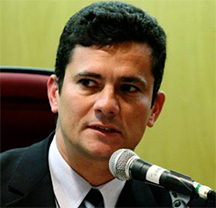SAO PAULO, (Reuters) – Recent setbacks for prosecutors in a huge corruption scheme at Brazil’s state-run oil company Petroleo Brasileiro SA suggest they will struggle to win as many convictions as they seek.

The Supreme Court’s decision last week to release from jail nine executives at construction companies suspected of paying bribes in the scheme, and put them under house arrest instead, reduces the chances of prosecutors convincing them to strike plea bargain deals that could result in additional charges.
The ruling, and a separate decision by the court to halt some new depositions, suggest defense efforts to poke holes in the investigation, often by citing procedural issues, are starting to bear fruit.
To be sure, legal experts do expect more convictions in the case in which former executives at Petrobras, as the company is known, and some of its suppliers are accused of inflating the value of service contracts and funneling the excess funds into their own bank accounts and to political parties, including that of President Dilma Rousseff.
Rousseff is not being investigated, but her ratings have suffered because of her party’s ties to the scandal and fears that economic fallout from the investigation will tip Brazil into recession this year.
Prosecutors say bank records and witness testimony show at least 2.1 billion reais ($700 million) was embezzled. The probe has already led to 97 indictments, including four former Petrobras executives, the senior engineering executives, and the treasurer of Rousseff’s Workers’ Party.
Dozens of elected officials have also been implicated in a separate investigation in Brasilia.
The first eight convictions came on April 22, including a former Petrobras executive and a black-market money dealer, who were sentenced to a year of house arrest and three years in jail, respectively.
Yet the recent Supreme Court decisions suggest prosecutors may struggle to reach their stated goal of presenting more charges and sending scores of politicians and executives to jail to change the way corruption is treated and punished in Brazil.
“It’s going to be hard to get these convictions,” said Luiz Flavio Gomes, a criminal lawyer and director of the Avante Institute, an anti-crime organization in Sao Paulo, citing Brazil’s “precarious justice system” and the recent release of some defendants.
In ordering the release of the nine executives, the Supreme Court rejected federal judge Sergio Moro’s argument that the suspects could commit more crimes unless they were locked up.
Moro, who is guiding the prosecution, has not publicly commented on the ruling. But keeping the executives in jail was seen as key to pressuring them to reveal what they knew about the graft and bring about more indictments.
A lawyer for the vice president of construction firm Camargo Correa told Folha de S.Paulo newspaper that “the number of plea bargains will likely fall” because of the ruling.
UNTOUCHABLES
Since the scandal first broke last year, the investigation has enjoyed broad support among Brazilians who believe endemic graft and bribery keep their resource-rich country from reaching its full potential.
The 42-year-old, telegenic Moro and a group of nine prosecutors in the southern city of Curitiba, where much of the investigation is carried out, have become celebrities. A photo of the prosecutors with the headline “The Untouchables” ran on the front page of Folha a few weeks ago.
Yet some warn the publicity may have inflated expectations.
“Because of the size of the investigation and the amount of media attention it generates … you almost end up assuming (the defendants) are guilty,” said Tatiana Farina, an economist affiliated with the University of Sao Paulo.
Moro and the prosecutors declined to be interviewed for this story. They have previously defended their tactics, including the use of plea bargains, as permitted under Brazilian law and necessary to crack a case as big as Petrobras.
One prosecutor, Deltan Dallagnol, has spoken of the opportunity to spur a “social transformation” by showing that corruption will not be tolerated.
One major obstacle, however, is the justice system itself.
Courts often have unclear or overlapping jurisdictions, making them prone to small procedural errors.
Defense lawyers argue that key elements of the case should be heard not under Moro’s jurisdiction in Curitiba but in Rio de Janeiro, where Petrobras is based.
Leonardo Sica, the president of the Sao Paulo bar association, said that argument could get some of Moro’s rulings thrown out in coming months.









